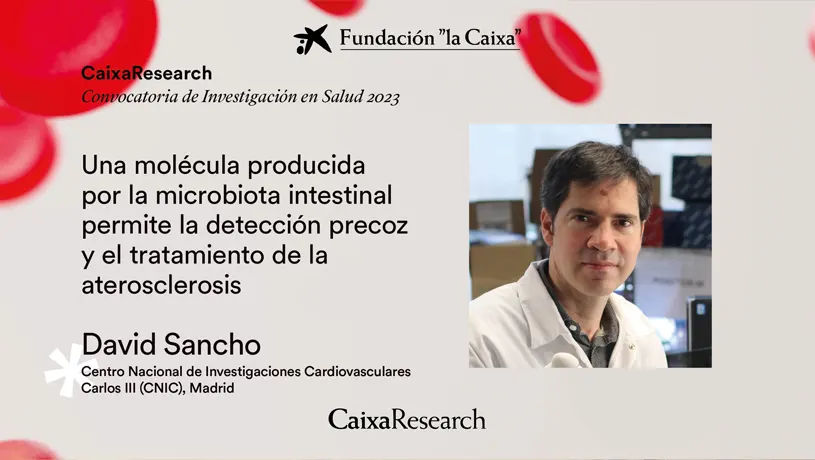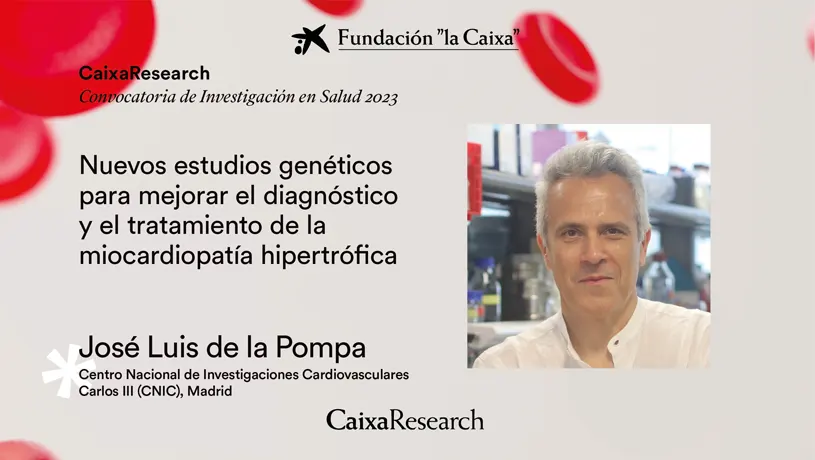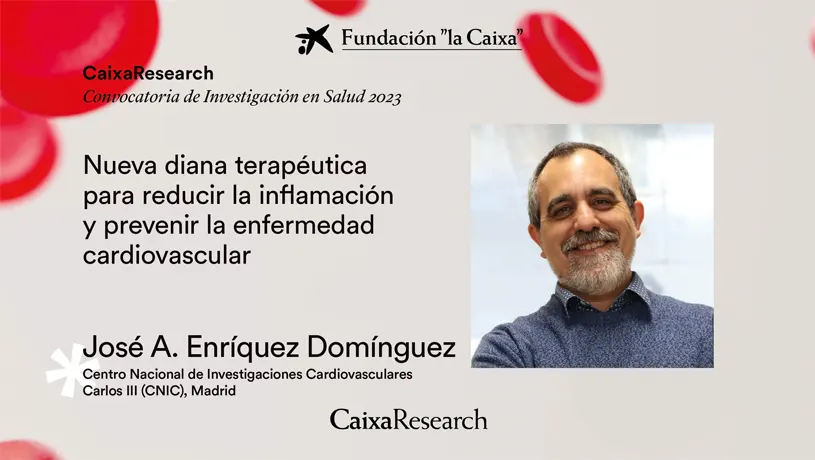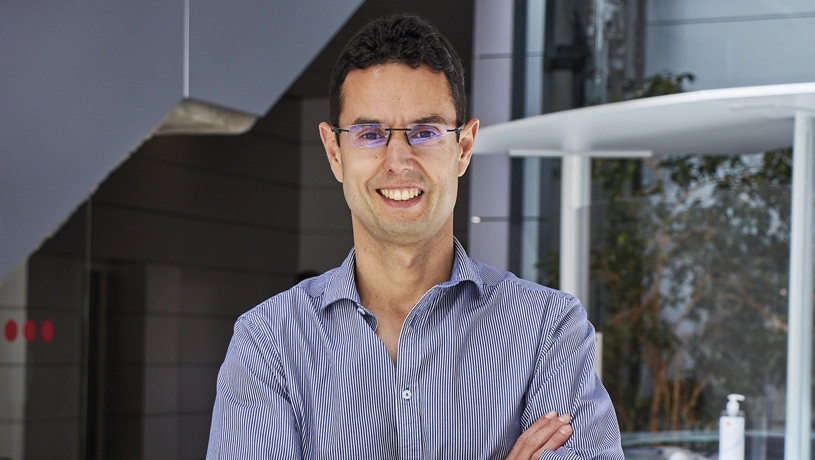Three CNIC Projects selected as Fundación La Caixa “Health Call 2023” Research Projects
Fundacion La Caixa promotes biomedical and health research in Spain and Portugal through a health call that awards 25.3 million euros
Three CNIC projects were selected by FUNDACIÓN LA CAIXA in the 2023 edition of its CaixaResearch Health Call.
The projects are:
- A molecule produced by the intestinal microbiota allows early detection and treatment of atherosclerosis: Dr David Sancho.
- Novel genetic studies to improve the diagnosis and treatment of hypertrophic cardiomyopathy: Dr José Luis de la Pompa.
- A new therapeutic target to reduce inflammation and prevent cardiovascular disease: Dr Jose Antonio Enríquez.
These three projects are joined by another, “Study of the regenerative properties of endothelial progenitor cells that promote the formation of new blood vessels”, led by Mariona Graupera of the Josep Carreras Leukaemia Research Institute, a consortium project with CNIC’s Rui Miguel Benedito and Alejo Rodriguez-Fraticelli of the Fundació Institut de Recerca Biomèdica (IRB Barcelona)
This year’s call, which received 493 proposals, is particularly aimed at tackling challenges in health such as infectious diseases (8 of the chosen projects), neurosciences (7), cardiovascular and related metabolic diseases (7), and oncology (6). Another 5 of the chosen projects will develop technologies to aid in the same fields.

- Project leader: David Sancho.
- Consortium project with Mabel Loza, Fundación Kaertor.
- Award received: 967.620,20 euros.
Atherosclerosis is the build-up of fats, cholesterol and other substances, leading to the inflammation of arterial walls. Plaques are formed which, in the long term, produce a narrowing of blood vessels or break them, generating the formation of a clot that blocks blood flow. This may lead to serious cardiovascular complications, such as heart attack, stroke or dementia, major causes of morbidity and mortality.
Early detection of the development of atherosclerosis currently relies on advanced imaging techniques; however, these techniques are expensive and complicated to perform on a large scale in hospitals. In previous studies with an animal model, the group identified a molecule produced by bacteria of the gut microbiota that is an early biomarker for atherosclerosis and blocks interaction with its receptor, preventing its progression.
David Sancho: “The knowledge generated may make it possible to find new targets for the treatment of atherosclerosis”
The researchers in this project will study in greater depth the possible use of identifying this molecule’s concentration in plasma as a biomarker to determine the first phases of atherosclerosis and predict future cardiovascular events in a simpler way than with the complex techniques of advanced imaging. They will also research the mechanisms by which this compound contributes to the disease progression. The knowledge generated may make it possible to find new targets for the treatment of atherosclerosis.

- Project leader: José Luis de la Pompa.
- Consortium project with Juan Ramón Gimeno Blanes, University of Murcia and Ángel Raya Chamorro, the Bellvitge Biomedical Research Institute (IDIBELL).
- Award received: 999.668,18 euros.
One in 500 people suffers from hypertrophic cardiomyopathy, a hereditary heart disease that causes a thickening of the heart muscle, the myocardium. This thickening can make it harder for the heart to contract and relax, complicating the expulsion of blood and forcing the heart to work more intensely. This exposes patients to the risk of serious complications and other related problems.
Various lines of research have shown that half of the patients with this disease present mutation in genes related with sarcomeres, the functional units responsible for the contraction of muscular fibres. Another group of patients carry one or several gene mutations that are not related with sarcomeres. It is not fully understood whether these mutations are the cause of the disease nor if the presence of multiple mutations in a single patient increases the severity of the cardiomyopathy. Answering these questions is of great importance to achieve an exact, early diagnosis, which would a timely start of monitoring and treatment, and ultimately improve results for patients.
José Luis de la Pompa: “Our final aim is to use the knowledge obtained to optimize disease diagnosis and management”
The goal of this project is to discover new gene mutations that are not related with sarcomeres. To do so, we will analyse samples from families affected by the disease who do not present mutations in sarcomeric genes. Once these mutations have been identified, we will conduct studies using human cells and murine models to determine their contribution to the development of the disease. The final aim is to use the knowledge obtained to optimize disease diagnosis and management.

- Project leader: José Antonio Enríquez.
- Award received: 498.000 euros.
Cardiovascular diseases are the first cause of death in the world. Although the term is very wide-ranging as it covers different diseases with different physiopathological mechanisms, the majority share the common characteristic of presenting with inflammation which worsens the disease. So, reducing heart inflammation would be a major medical advance in the treatment of these diseases.
José Antonio Enríquez: The team will study how activation of the enzyme affects heart function, and verify whether its inhibition provides protection against heart disease”.
In previous research, the project team discovered that the FGR kinase, an enzyme that plays a crucial role in regulating cellular physiological processes, activates when there is cell stress. When it activates in mitochondria, it promotes inflammation. It has been observed that the amount of FGR is higher in cardiovascular diseases such as arrhythmogenic cardiomyopathy.
In this project, the team will study how activation of the enzyme affects heart function and will verify whether its inhibition provides protection against heart disease.
Study of the regenerative properties of endothelial cells that enable the formation of new blood vessels.

- Project leader: Mariona Graupera, Josep Carreras Leukaemia Research Institute.
- Consortium project with Rui Miguel Benedito, CNIC; Alejo Rodriguez-Fraticelli, Institute for Research in Biomedicine (IRB - Barcelona).
- Award received: 999.918 euros.
Endothelial cells line blood cells, which supply nutrients and oxygen to the organism’s cells. When the supply is insufficient, endothelial cells activate to form new vessels in a process called angiogenesis. However, in diseases like ischaemic heart disease, heart attack and metabolic diseases, or in ageing, the process goes wrong. So far, we do not know the reasons that cause this process to fail.
Until now, the most commonly accepted theory was that any endothelial cell was able to proliferate in response to tissue damage. However, in their previous studies the project team observed that only a small group of endothelial cells retains the capacity to proliferate after determined signals, and it is these that are responsible for sustaining tissue generation and growth. Now, using DNA marking techniques, researchers want to identify and characterize the group of cells that maintain the regenerative properties enabling angiogenesis. The knowledge obtained has implications for tissue engineering, and opens the door to developing new therapeutic strategies for diseases that involve poor vascularization.













